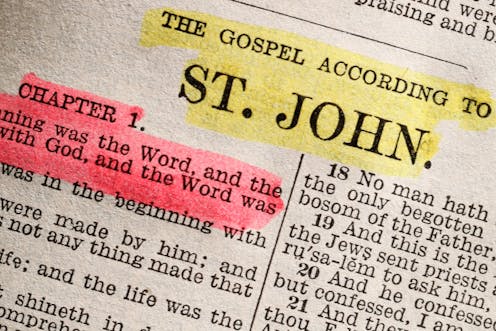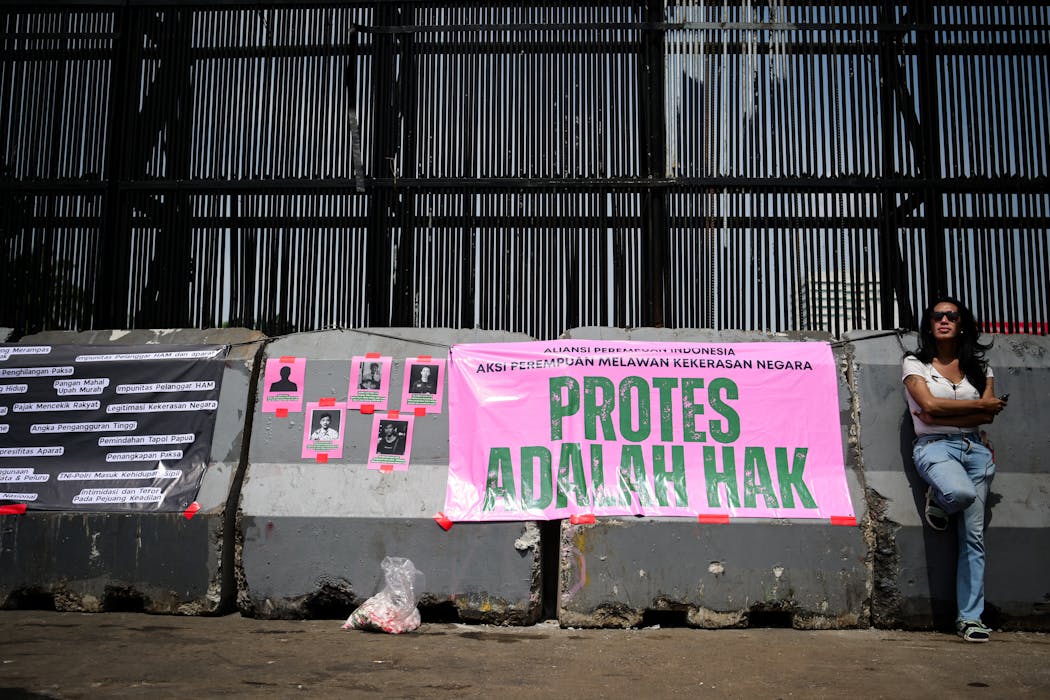Oklahoma’s superintendent orders public schools to teach the Bible – relying on controversial views about religious freedom
- Written by Mark Satta, Assistant Professor of Philosophy, Wayne State University

In the days since Oklahoma’s state superintendent, Ryan Walters, ordered school districts to teach the Bible[1], he’s been defending his mandate[2].
For example, he claimed in an interview on NewsNation[3] that the Bible had “been removed from classrooms, and we’re saying, listen, we’re proud to be the first state to bring it back.”
In reality, U.S. federal law has never prevented public schools from including the Bible as an appropriate aid in the teaching of secular subjects. Rather, what current Supreme Court precedent forbids is use of the Bible as part of religious training in public schools.
Walters’ mandate – sent to districts on June 27, 2024 – seems to blur this line between secular and religious instruction. It also contributes to a larger trend of state officials striving to weaken the boundaries between religion and state.
Another prominent example is the new law in Louisiana[4] requiring every public school classroom to display the Ten Commandments. This law has already generated a lawsuit[5] from civil rights groups.
As someone who studies religious liberty law[6], I see these state initiatives as part of a larger push to increase the presence of Christianity in the public sphere and to challenge constitutional protections for religious freedom.
Secular vs. religious use
The major Supreme Court case dealing with Bible reading in public schools is Abbington v. Schempp[7], which was decided in 1963.
At issue was a Pennsylvania law, enacted in 1913, requiring that “At least ten verses from the Holy Bible shall be read, without comment, at the opening of each public school on each school day.” The law allowed children to be excused at their parents’ request.
The Schempp family, whose children attended Pennsylvania public schools, sued on the grounds that the law violated the First Amendment of the U.S. Constitution[8].
In an 8-1 decision, the Supreme Court agreed that the law violated the First Amendment’s establishment clause[9], which forbids government from making any law “respecting an establishment of religion.”
Originally, the establishment clause applied only to the federal government. That changed after the ratification of the 14th Amendment in 1868[10]. The Supreme Court has interpreted the 14th Amendment as requiring state governments[11], including public schools[12], to abide by most of the Bill of Rights.
In the Pennsylvania case, the Supreme Court clarified that public school lessons involving the Bible or religion can be constitutional[14] “when presented objectively as part of a secular program of education.” For example, religious texts can be used in classrooms as part of a comparative religion lesson, or when studied as literature.
Crucially, however, the court found that the Pennsylvania law violated the establishment clause because its purpose was religious, not secular. The daily Bible reading constituted “a religious ceremony” that “was intended by the State to be so,” whether or not children were allowed to be excused.
Christian nationalism
Messaging about the new mandate blurs the distinction between secular and religious Bible instruction.
For example, in Walters’ memo instructing schools to teach the Bible[15], he states that “The Bible is one of the most historically significant books and a cornerstone of Western civilization, along with the Ten Commandments. They will be referenced as an appropriate study of history, civilization, ethics, comparative religion, or the like, as well as for their substantial influence on our nation’s founders and the foundational principles of our Constitution.”
Similarly, in an announcement[16] about the mandate, he claimed that the Bible was “a necessary historical document to teach our kids about the history of this country, to have a complete understanding of Western civilization, to have an understanding of the basis of our legal system.”
These explanations highlight the challenge of differentiating secular and religious uses of the Bible in education. Reading religious texts may provide useful context for some history lessons – for example, in explaining some colonists’ beliefs. Yet arguments that the Bible is central to understanding U.S. history and law are also a pillar of Christian nationalism[17], which is the belief that Christianity should have a privileged place in politics, law and society in the U.S. because “America is a Christian nation.”
Many scholars reject this controversial view of history[18], arguing, for example, that it misrepresents the founders’ religious and political views[19].
Yet this belief has been gaining momentum within the U.S. political right. As Yale sociologist Philip Gorski[20] has noted[21], Christian nationalism “is no longer operating beneath the surface or in the background. It’s now front and center at commanding heights of power.”
According to a 2022 Pew survey[22], more than 4 in 10 Americans think that “the U.S. should be a Christian nation,” though they disagree about what that means.
The Americans United for Separation of Church and State describes Walters’ mandate[23] as “textbook Christian Nationalism” and has stated that they are “ready to step in” to try to block it.
Part of a trend
Walters’ mandate aligns with a broader movement to challenge limits around religion in public schools. This movement has made significant strides at the Supreme Court in recent years.
For example, in 2022 the court ruled that, in at least some circumstances, public money could be used for tuition at private religious schools[25] in Maine, and that a public high school football coach had the right to pray with his players[26] at the 50-yard line after games.
Another challenge occurred in Oklahoma in 2023, when the Oklahoma Statewide Virtual Charter School Board approved a charter for a Catholic institution. This move, which was supported by Walters[27] and Gov. Kevin Stitt[28], would have established the nation’s first religious charter school. The Oklahoma Supreme Court struck down that plan on June 25, 2024[29], finding it unconstitutional.
Two days later, Walters sent his memo about Bible instruction. Oklahoma law already permits[30] using the Bible to teach about religion, history and other matters in public schools. Walters’ mandate, however, goes much further. It mandates, rather than merely permits, statewide Bible instruction. “Every teacher, every classroom in the state will have a Bible[31],” he pronounced.
Under current precedent, the mandate appears unconstitutional. In order for that to change, Walters’ mandate or another one like it may need to end up before the U.S. Supreme Court.
References
- ^ ordered school districts to teach the Bible (www.oklahoman.com)
- ^ defending his mandate (www.usnews.com)
- ^ he claimed in an interview on NewsNation (www.youtube.com)
- ^ new law in Louisiana (apnews.com)
- ^ generated a lawsuit (abcnews.go.com)
- ^ studies religious liberty law (papers.ssrn.com)
- ^ Abbington v. Schempp (tile.loc.gov)
- ^ the First Amendment of the U.S. Constitution (constitution.congress.gov)
- ^ the First Amendment’s establishment clause (firstamendment.mtsu.edu)
- ^ the 14th Amendment in 1868 (constitution.congress.gov)
- ^ state governments (tile.loc.gov)
- ^ public schools (tile.loc.gov)
- ^ AP Photo/Mariam Zuhaib (newsroom.ap.org)
- ^ can be constitutional (tile.loc.gov)
- ^ instructing schools to teach the Bible (www.documentcloud.org)
- ^ an announcement (www.youtube.com)
- ^ Christian nationalism (www.christianitytoday.com)
- ^ this controversial view of history (www.unionsquareandco.com)
- ^ misrepresents the founders’ religious and political views (religionnews.com)
- ^ Philip Gorski (sociology.yale.edu)
- ^ noted (www.nytimes.com)
- ^ a 2022 Pew survey (www.pewresearch.org)
- ^ describes Walters’ mandate (www.au.org)
- ^ AP Photo/Sue Ogrocki (newsroom.ap.org)
- ^ public money could be used for tuition at private religious schools (theconversation.com)
- ^ right to pray with his players (www.supremecourt.gov)
- ^ by Walters (www.youtube.com)
- ^ Gov. Kevin Stitt (oklahoma.gov)
- ^ struck down that plan on June 25, 2024 (www.koco.com)
- ^ already permits (www.oklahoman.com)
- ^ will have a Bible (www.youtube.com)
Authors: Mark Satta, Assistant Professor of Philosophy, Wayne State University





